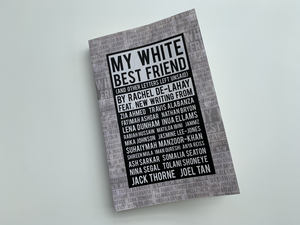Book Review: MY WHITE BEST FRIEND (AND LETTERS LEFT UNSAID), Rachel De-Lahay and Milli Bhatia
This extremely topical compilation of thought-provoking letters speaks to us all

![]() My White Best Friend (And Other Letters Left Unsaid) was originally commissioned by The Bunker Theatre in March 2019 as a festival where letter-writing engages with a range of provocative topics such as racial tension, emotional engagement, unspoken prejudice and underlying social issues.
My White Best Friend (And Other Letters Left Unsaid) was originally commissioned by The Bunker Theatre in March 2019 as a festival where letter-writing engages with a range of provocative topics such as racial tension, emotional engagement, unspoken prejudice and underlying social issues.
In the wake of a turbulent summer of racial tension throughout the world, this engaging and deeply thought-provoking collection of 23 letters is now available in book form - a carefully designed anthology of heartfelt and emotional writing. Curated by Rachel De-Lahay and Milli Bhatia, the book features new work from writers as diverse as poet Zia Ahmed to screenwriter Rabiah Hussain.
Most letters target the subjects of race, with class, power and politics also prominent. Most, if not all, are necessarily uncomfortable.
The titular letter comes first, written by De-Lahay herself; it neatly details what a black person can never say to her white best friend. It is a starkly honest, funny and poignant account of how a young girl feels abandoned and misunderstood by a person she also loves and feels very close to. How is it that your best friend does not support you and your basic rights, albeit unknowingly? Race creates a distance between the friends that is conveyed in a highly credible manner. It feels so raw with emotion on the page that it is no wonder that this writing was so well received when performed on stage.
Fatimah Asghar's letter is written by Alison - an amalgamation of all the white friends that Asghar has had. The letter recalls the process of friendship through school, theatre club, university and life afterwards set in Cambridge, Massachusetts. It is clear there is kindness and camaraderie, but there are also problematic events that centre around racial and financial divisions in American society. This is not just black versus white. For a British reader, further exploration of these elements would be both helpful and interesting, but they are not really delved into.
It is, perhaps, problematic that Asghar writes from a white point of view and how white people view her as a non-white person, but possibly there is a message of how different races are often lumped into homogenous groups according to skin colour. Here, it is the white people who are in one mass group in their attitudes and behaviour.
A letter from a white male to his black best friend and the response, written by grime MC and music producer Jammz, is a short exploration of two friends growing up together and then growing apart. Constructed as a series of rhythmic, poetic raps, this is a poignant and sharply written piece.
Jammz points out that he didn't get into the university when his friend did, despite attaining the same grades. His friend refuses to acknowledge that this is down to race; he talks about trying to blend in, but Jammz simply sees this as blindness to privilege. This typifies the difficulties with these divisions - young people often want to be like their friends, but what if the ability to pick and choose what they emulate emphasises the differences?
Not every piece focuses on race. The letter written by Jack Thorne is to a doctor who treated him for an acute skin condition years ago. Despite Thorne revealing he has since recovered from the debilitating condition, the letter is a riposte to this particular doctor who told him that the unbearable pain he was in at the time was the best he could ever expect. It is a warning as to how actions and behaviours from those we trust can have potentially catastrophic consequences, and an appeal for everyone to be more mindful and kind.
The compilation is not an easy read, but nor is it meant to be. To write letters is a clever medium to express unspoken frustrations, disappointments and anger. The pieces are not always perfectly constructed and it sometimes feels as though a live performance would enhance them, particularly the sections that instruct the audience to move around so that members of different races are redistributed. However, they all communicate the authors' inner feelings and invite the reader to respond, to question and to understand.
It is a slim book that belies its powerful contents. It highlights problems and does not always suggest answers. However, it leaves the reader with the lasting feeling that more communication from every side would only help to achieve more understanding and cohesion. This compilation is a great start.
My White Best Friend (And Other Letters Left Unsaid) by Rachel De-Lahay and Milli Bhatia is available now from Bloomsbury
Reader Reviews
Videos

